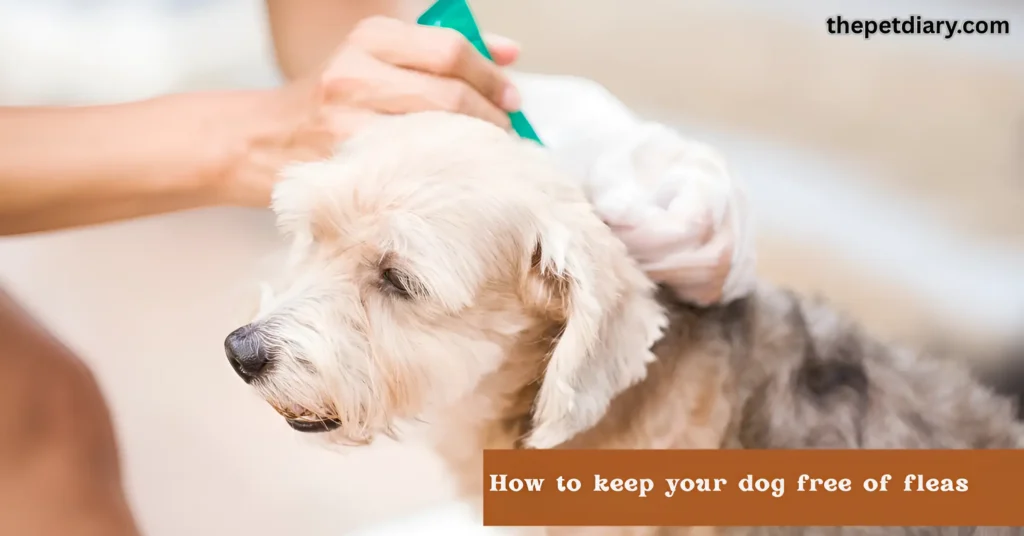How to keep your dog free of fleas is essential for their happiness and well-being. Intense itching, allergic reactions, and even disease transmission are all possible outcomes of fleas. Use a dependable flea remedy to keep your dog flea-free, whether it’s an oral medication, topical solution, or flea collar that your veterinarian has advised. Regular grooming and monthly flea inspections can identify infestations early. To keep your home tidy, vacuum and wash your dog’s bedding. Throughout the warmer months, stay away from areas with high flea activity. By combining prevention, early detection, and a comfortable environment, the fine flea remedy for puppies keeps your domestic dog healthy, content, and free of itching.
Regular Grooming: How to Keep Your Dog Free of Fleas
Frequent grooming is essential to preventing fleas. Brushing your dog’s fur not only keeps it clean and healthy, but it also makes it simpler to spot flea or flea dirt (little black dots) infestations.
High-Quality Flea Prevention Products
Consult your veterinarian for recommendations on the best flea prevention products for your dog. oral medications, and flea collars. Consider your dog’s size, age, and any specific medical conditions when choosing a product.
Maintain a Clean Living Environment
In addition to dwelling on your dog, fleas can also infest your home. Wash and vacuum your dog’s blankets, toys, and any other items they frequently visit. Consider using flea sprays or powders designed especially for your home while taking safety precautions.
Yard Maintenance
1. Keep Your Yard Clean: How to Keep Your Dog Free of Fleas
If your dog spends time outside, keep your yard tidy. Mow the yard, trim tall grass, and remove any debris in which fleas and their eggs could hide. Consider using pet-safe outdoor flea control products after speaking with your veterinarian.
Natural Remedies
Certain natural remedies can be used in addition to conventional methods for flea treatment for dogs. For instance, you can help keep fleas away from your dog by adding apple cider vinegar to their water. Do you consult your veterinarian before using natural home remedies for fleas.
Regular Vet Check-Ups
Regular veterinary examinations are essential for your dog’s overall health and can help identify flea problems early. Your veterinarian can recommend the best preventative and treatment plans.
Watch for Signs of How to Keep Your Dog Free of Fleas
If your dog is scratching a lot, has red or irritated skin, is losing hair, or has tiny, fast-moving insects on them, these are signs of a flea infection dogs. By acting quickly, a minor problem can be prevented from becoming a serious one.
Consistency is Key: How to Keep Your Dog Free of Fleas
Consistency is key when it comes to flea management. Maintain a consistent grooming and prevention routine, particularly during the winter months when flea activity may be lower.
Even though fleas can be a recurring issue, you can keep your cat flea-free with the correct information. To safeguard your dog’s health, don’t forget to consult your veterinarian. A flea-free dog is content and healthy.
“Conclusion:” How to Keep Your Dog Free of Fleas
An ongoing, multi-step plan to keep your dog flea-free includes regular grooming, flea control products recommended by your veterinarian, and a clean living environment. Remember, yard care is just as important as inside care. Whether you use traditional treatments or natural remedies that your veterinarian has suggested, the goal is the same: protect your dog from the pain and health risks that fleas provide. Regular veterinary exams and knowledge of the early flea warning symptoms are essential components of any prevention plan. At ThePetDiary.com, we believe that with the right care and consistency, you can ensure your pet’s pleasure, health, and lack of itching all year long.
❓ Frequently Asked Questions (FAQs)
1. What is the quality way to keep my dog flea-free year-round?
The best approach to keep fleas away is to follow a regular regimen that includes regular grooming, flea treatments prescribed by your veterinarian, maintaining a clean home, and taking care of your yard. Flea infestations can be minimized and your dog’s health preserved by combining these measures.
2. How frequently must I groom my canine to save it from fleas?
Early flea detection can be achieved by cleaning your dog’s fur several times a week and using a flea comb. Regular grooming not only maintains their coat clean but also facilitates the prompt detection of dust, fleas, and skin irritations.
3. Do I need to treat my domestic and yard for fleas, too?
In addition to carpets, fixtures, and pet beds, fleas can survive in your backyard. Maintain your outside areas, vacuum frequently, and clean your dog’s belongings. If necessary, think about applying pet-secure flea repellents both indoors and outdoors.
4. Are herbal treatments effective for flea prevention in dogs?
With your veterinarian’s approval, you can use natural flea repellents such as apple cider vinegar or essential oils.
5. How can I tell if my canine has fleas?
The existence of fleas on your dog’s coat, crimson or inflamed pores and skin, frequent scratching, and obvious flea dirt (little black dots) are typical indications. If you see any of these symptoms, act quickly and consult your veterinarian.
6. How to get rid of fleas on dogs?
To remove fleas, start by using a vet-approved flea treatment, such as topical solutions, oral medications, or flea collars. Bathe your dog with a gentle flea shampoo, and use a flea comb to remove fleas and eggs from their coat. Wash your dog’s bedding, clean your home thoroughly, and treat outdoor areas to prevent re-infestation. Always consult your vet for the safest and most effective flea control plan.


